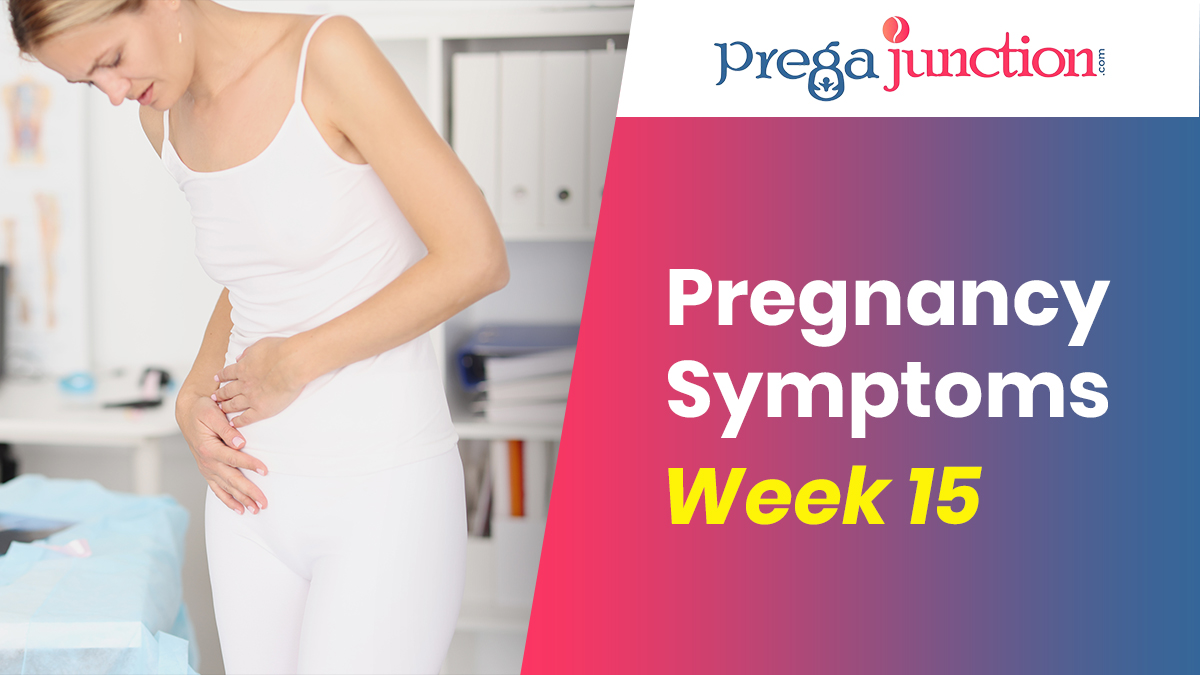As you march into week 15 of pregnancy, would-be mothers are more likely to experience swelling of hands, feet, legs, and ankles making the rings fit tight. Although some early pregnancy symptoms recede, a few pregnancy signs can continue and need management.
With its rapid growth and development, the baby develops fine blood vessels with a thin skin layer below the lanugo formed in week 14 of pregnancy. The baby is now pear-shaped producing small amounts of urine and the placenta supporting the kidney functions.
Further in the article, while we dive into week 15 of pregnancy symptoms, you will know everything about the fetal development and growth status this week.
Also Read: Leg Pain During Early Pregnancy: What does it indicate, and how can you reduce it?
In this Article
Baby’s development @ Week 15 of Pregnancy
At Week 15, you are close to 4 months of pregnancy completion. Grow, grow, grow is all that your baby knows. The baby has reached its 10 cm landmark height from the head to bottom and weighs approximately 70 gms or more. A lot more is happening with the baby’s developments like;
Placenta owning the kidney functions
The placenta balances or controls the fluid system and passage of the waste into the maternal system until the kidneys are fully functional.
The boy and girl characteristics begin development.
Along with the other reproductive parts of the baby, the genitals, i.e., the penis (in boys) and clitoris (in girls), develop this week.
The blood vessels emerge.
While the layer of lanugo is in the process of completion, the baby’s new blood vessels and a thin skin layer develop beneath the fine hair layer of the fetus.
The most exciting part as a mother is that you can hear your baby’s heartbeat and the noises within your tummy. Not to forget the constant aerobic movements- jerking, kicking, curling of the baby.
Also Read: NT NB Scan During Pregnancy: What is It, When is It Done, What Will You Find Out from the Scan?
Mom-to-be @ Week 15 of Pregnancy
The journey to motherhood is full of amusements and overwhelming experiences. Be it the adventurous, delightful visuals and experiences in the womb or the unpleasant pregnancy symptoms, food aversions, and smell sensitivity, the mother-to-be is engrossed in loads of activities happening within her.
Some of the pregnancy symptoms observed this week are:
- Plaque formations on the teeth leading to gum issues- Maintain good oral health.
- Unique food aversions and cravings any time of the day
- Increase in milky white vaginal discharge
- Weekly weight gain of nearly half a kg or more
- As the pregnancy progresses, you may be likely to feel hungry – have regular small meals or can have heartburn and indigestion problems.
- Increased round ligament pain during movement actions such as coughing, sneezing, rolling over the bed, sitting, etc.
- Swelling of hands, legs, and feet- A sudden increase in swelling can lead to preeclampsia.
Also Read: USG TVS Test Price in India 2022: USG TVS Test Cost in Popular Clinics in India
What is preeclampsia? What are its symptoms?
Preeclampsia is a condition characterized by a sudden increase in blood pressure and organ damage during pregnancy usually, after week 20 of pregnancy. One of the signs is swollen hands, feet, and face. However, this sign is observed in normal pregnancy as well. Hence, it is essential to check the other preeclampsia symptoms such as,
- Less frequent urination,
- Severe headaches,
- Excess protein content in the urine
- Pain in the upper abdominal region
- Shortness of breath and check with your doctor immediately.
Things to consider @ Week 15 of Pregnancy
Healthy nutrition is the key to a healthy pregnancy. Since your baby needs nutrients to grow big and healthy, you will need to make sure you binge for healthy food alternatives. And take care of you and your baby’s nutritional requirements. Some of the other things required to be taken care of this week include;
- Monitor the weight. Check with your doctor for optimal weight gaining options or feel you are putting up a lot of weight.
- Continue with the pelvic floor exercises necessary for easy delivery and to prevent urinary incontinence.
- Ensure you get enough calcium and vitamin D content essential for the baby’s bone and teeth development. Opt for calcium-backed foods such as milk, milk products, soya, cooked fishes-salmon, tuna, sardines, etc. Your doctor also can recommend calcium supplements for the extra calcium boost.
- Frequent plaque formations on the teeth are a challenging pregnancy symptom during pregnancy. Maintaining healthy oral habits and regular visits to the dentist to free your teeth from the disease-causing gum bacteria is necessary.
- Pregnancy yoga asanas, regular walks, exercises can ensure optimal pregnancy weight gain, easy childbirth, and healthy conception.
- If you have a family history of a genetic condition or have had a previous child with congenital disabilities, your doctor may advise you for a prenatal screening called amniocentesis. Amniocentesis is performed between week 15 to week 20 of pregnancy.
What is amniocentesis? How is it performed?
Amniocentesis is a test conducted during the 15th to 20th week of pregnancy to check for genetic or chromosomal conditions in the fetus- Down’s syndrome, Sickle cell anemia, Thalassemia, Cystic fibrosis, Patau’s syndrome, Edwards’ syndrome. Here, the sample of amniotic fluid in the amniotic sac around the fetus is drawn using a small needle insertion and analyzed. The whole process of amniocentesis is ultrasound-guided.
Conclusion
At week 15, the fetal blood vessels develop, and the circulatory system gets in place. The mother-to-be will need to keep a watch on her nutrient intake. Anytime between week 15 to 20 of pregnancy, the mother can choose to get tested for genetic defects in the developing fetus through amniocentesis. If you observe sudden swelling of your legs, hands, and face or any abnormal pregnancy symptoms, connect with your doctor immediately.
Reference
Overview | NHS




